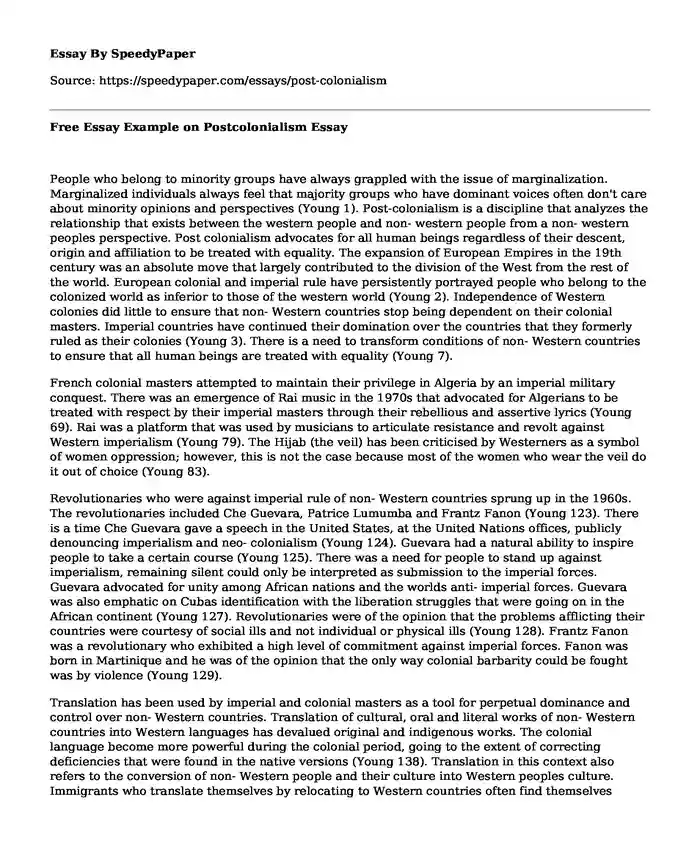People who belong to minority groups have always grappled with the issue of marginalization. Marginalized individuals always feel that majority groups who have dominant voices often don't care about minority opinions and perspectives (Young 1). Post-colonialism is a discipline that analyzes the relationship that exists between the western people and non- western people from a non- western peoples perspective. Post colonialism advocates for all human beings regardless of their descent, origin and affiliation to be treated with equality. The expansion of European Empires in the 19th century was an absolute move that largely contributed to the division of the West from the rest of the world. European colonial and imperial rule have persistently portrayed people who belong to the colonized world as inferior to those of the western world (Young 2). Independence of Western colonies did little to ensure that non- Western countries stop being dependent on their colonial masters. Imperial countries have continued their domination over the countries that they formerly ruled as their colonies (Young 3). There is a need to transform conditions of non- Western countries to ensure that all human beings are treated with equality (Young 7).
French colonial masters attempted to maintain their privilege in Algeria by an imperial military conquest. There was an emergence of Rai music in the 1970s that advocated for Algerians to be treated with respect by their imperial masters through their rebellious and assertive lyrics (Young 69). Rai was a platform that was used by musicians to articulate resistance and revolt against Western imperialism (Young 79). The Hijab (the veil) has been criticised by Westerners as a symbol of women oppression; however, this is not the case because most of the women who wear the veil do it out of choice (Young 83).
Revolutionaries who were against imperial rule of non- Western countries sprung up in the 1960s. The revolutionaries included Che Guevara, Patrice Lumumba and Frantz Fanon (Young 123). There is a time Che Guevara gave a speech in the United States, at the United Nations offices, publicly denouncing imperialism and neo- colonialism (Young 124). Guevara had a natural ability to inspire people to take a certain course (Young 125). There was a need for people to stand up against imperialism, remaining silent could only be interpreted as submission to the imperial forces. Guevara advocated for unity among African nations and the worlds anti- imperial forces. Guevara was also emphatic on Cubas identification with the liberation struggles that were going on in the African continent (Young 127). Revolutionaries were of the opinion that the problems afflicting their countries were courtesy of social ills and not individual or physical ills (Young 128). Frantz Fanon was a revolutionary who exhibited a high level of commitment against imperial forces. Fanon was born in Martinique and he was of the opinion that the only way colonial barbarity could be fought was by violence (Young 129).
Translation has been used by imperial and colonial masters as a tool for perpetual dominance and control over non- Western countries. Translation of cultural, oral and literal works of non- Western countries into Western languages has devalued original and indigenous works. The colonial language become more powerful during the colonial period, going to the extent of correcting deficiencies that were found in the native versions (Young 138). Translation in this context also refers to the conversion of non- Western people and their culture into Western peoples culture. Immigrants who translate themselves by relocating to Western countries often find themselves marginalized. Translation of people from non- Western countries has led to the emergence of new identities; for instance, creolization of inhabitants of the Caribbean (Young 142). Fanon asserts that translation psychologically changes natives into a form that makes them aspire to be like Westerners (Young 144). Translation has de-cerebralized natives, making them view themselves as alienated from their culture. Fanon advocates for self- translation as one of the ways the natives can keep their culture intact and regain their self- respect amidst translation efforts from imperial forces (Young 146).
Work Cited
Young, Robert. Postcolonialism. Oxford: Oxford University Press, 2003. Print.
Cite this page
Free Essay Example on Postcolonialism. (2019, Nov 07). Retrieved from https://speedypaper.net/essays/post-colonialism
Request Removal
If you are the original author of this essay and no longer wish to have it published on the SpeedyPaper website, please click below to request its removal:
- Financial Management Questions. Paper Example.
- FDA Regulations, Food Safety Essay Sample
- How to Get a Promotion Essay Samples
- Organic Foods Stores Essay Sample
- Research Paper Sample on Women's Rights and Funding for Family Planning
- Essay Sample on Democracy and Political Culture
- [DataSet1] C:\Users\CADTech\Downloads\New folder\Santa Fe Grill - SPSS Data Set.savStatistics
Popular categories





